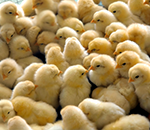Nanotechnologies in animal production and animal health care
NPEP Newsletter, October 2018
 The complementary nature of health and food industries is exemplified in animal production, where livestock health is directly linked to food production and food safety. Nanotechnology has a role to play in these industries to prevent and treat diseases that may impede the growth of animals and may also threaten human health.
The complementary nature of health and food industries is exemplified in animal production, where livestock health is directly linked to food production and food safety. Nanotechnology has a role to play in these industries to prevent and treat diseases that may impede the growth of animals and may also threaten human health.
Livestock diseases such as helminthiasis, trypanosomiasis, tick-borne diseases, influenza, and clostridia infections, have devastating effects on livestock population and animal production. Some of these diseases also have the potential to be transmitted to humans. Nanotechnology can play a vital role in the treatment of diseases by the development of smart drug delivery systems, which provide time-controlled, targeted, self-regulated, pre-programmed and effective dosage of drugs to the site of disease; in the process reducing damage to healthy cells in the body.
In order for farmers to achieve shortened animal production cycles to bring product to market sooner, antibiotics are currently used prophylactically as feed additives to prevent illness and accelerate growth. Unfortunately, this practice has led to the rise of drug-resistant bacteria that can cause illness in livestock and contaminate meat. A modified approach to using antibiotics prophylactically through nanotechnology can assist in bringing animals to their ideal weight rapidly without driving antibiotic resistance.
Nanotechnology can also be applied to deliver nutraceuticals more effectively and can increase nutrient bioavailability, enhance growth and performance, and provide a solution for nutrient deficiencies.
The nutraceutical industry has proliferated in recent years in the animal health sector. A study by Rosemarie U Höfler, Mahendra L Channa and Anand Nadar from the School of Laboratory Medicine and Medical Sciences at the University of KwaZulu-Natal, published in the Journal of South African Veterinary Association, used nano-emulsion formulas of multivitamin-multimineral supplements, which allows for a multiple variety of supplements to be presented together in one suspension and delivered simultaneously in a single bolus. Their particular study showed that supplementation using nano-emulsion technology may be useful in aiding growth and delaying the onset of hypertension and its effects in genetically hypertensive rats.
Supplementation, using nanotechnology, incorporated in the diets, especially in the growth phase of young animals, may be effective in maintaining general growth and health status. The major benefit of nanotechnology in delivering nutraceuticals is that feed supplements at the nanoscale are more bioavailable to animals than at a microscale, allowing more interactions to occur in the gut and better absorbance.
Nanotechnology is a growing and flourishing field that can play an integral role in improving animal production and animal health care. Nanoparticles are already available on the market and, with further research and expansion of technology, their properties will be enhanced for a wider range of applications. While the use of nanotechnology in animal production and animal health care is still in its infancy, encouraging results from research are driving further exploration.
10 Year Celebrations of the DST Nanotechnology Innovation Centres
Revolutionising the agricultural industry using nanotechnology
Health and safety concerns of agricultural nanotechnology
Commercial applications of nanotechnology in the agricultural sector
The safe and responsible development of nanotechnology in South Africa
Nanotechnologies in animal production and animal health care
Applied Nanotechnology and Nanoscience International Conference – ANNIC 2018
Third International Conference on Composites, Biocomposites and Nanocomposites
